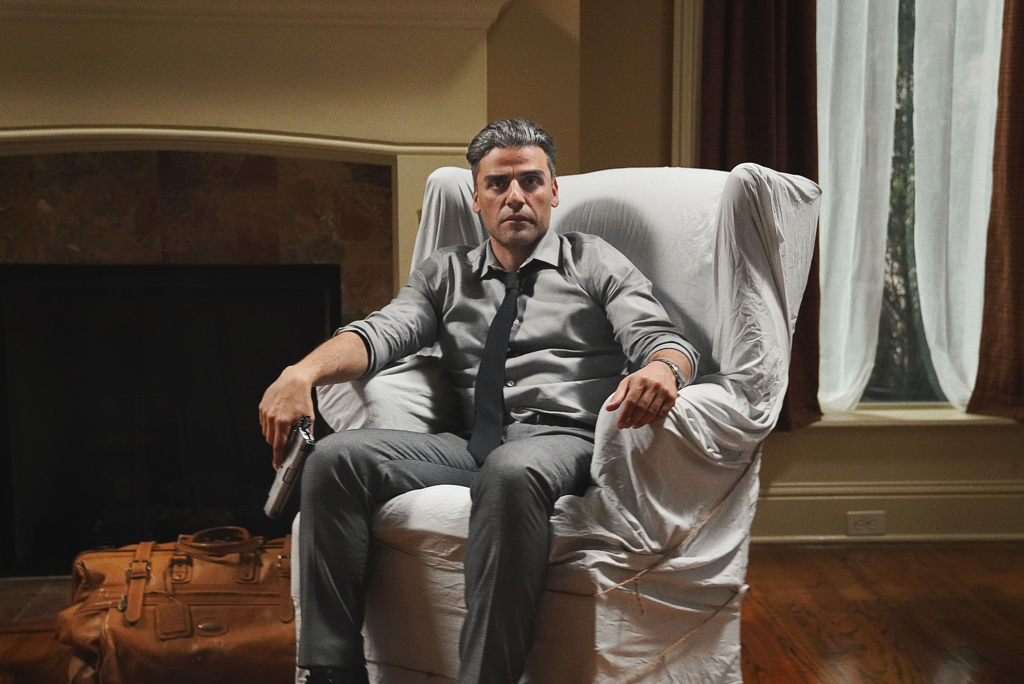Evan D.Anyone who had seen Paul Schrader’s existentially dreadful First Reformed had a pretty good sense that his newest effort would be anything but breezy. Man’s struggle against punishing oppression and his culpability for society’s sins has been the defining feature of Schrader’s long, illustrious career. With The Card Counter, it’s Oscar Isaac’s turn to grapple with the dark corners of his past. William Tell (Isaac) likes to keep a low profile and, after eight years behind bars, why wouldn’t he? Over that time he learned everything one would want to know about gambling. Bill can rattle off the odds on any given hand in a game of Texas Hold Em, calculate the potential return on a roll of the roulette wheel or, of course, count cards at a blackjack table. Bouncing from city to city, Bill epitomizes Kenny Rogers’ most famous advice: knowing when to walk away.
Isaac’s nuanced performance betrays a certain insecurity that William is trying to hide from those he shares a table with. It’s a quality we’ve seen Isaac bring before, with characters as diverse as Poe Dameron and Llewyn Davis, his slicked back charisma constructs a facade of assuredness over an underlying fear of letting the world get the better of him. In the case of Tell, that manicured exterior is a firewall from himself. Gambling is all he does. Tell doesn’t spend much time anywhere other than a casino or his car, en route to the next one. His low stakes life is far from the glamorous world of Oceans 11, but everything begins to fall apart when he runs into college dropout Cirk (Tye Sheridan) at a police conference seminar about interrogation. Both are there to see Colonel John Gordo (Willem Dafoe) speak about lie detectors and the importance of getting to the truth. Eventually the truth comes to bear. Years earlier Gordo had commanded a group of soldiers tasked with torturing captives during America’s wars in the Middle East. While his role in the “enhanced interrogation” landed him lucrative contracting jobs and speaking gigs, Gordo’s soldiers faced a much grimmer fate. One of those men was William Tell. Another was Cirk’s father, so haunted by his actions that he took the exit at the end of a shotgun barrel. Tell’s unconventional life begins to make sense in context. He’s moving too fast to dwell on the demons of his past, staking his very future on the turn of a card. For Cirk, the price has been paid for something he never did. His anger is more righteous and, in his mind, deserving of retribution. When the two cross paths Cirk looks to enlist Tell in his campaign of vengeance to punish Gordo. Bill takes a different tact, trying to save Cirk before it’s too late. So much of what Schrader is after in The Card Counter is compelling. Through Tell, he explores the ways in which people go over the edge, willingly or by coercion. Beyond that he looks at the aftermath of inhuman behavior and how perpetrators and victims hold onto guilt, assign blame, punish themselves and self regulate. Tell is hesitant to build relationships, not just with Cirk but also with La Linda (Tiffany Haddish), a fellow poker player and Tell’s sponsor in tournaments. He consistently punishes himself for the same actions that sent him to prison. Where The Card Counter runs into trouble is in its inability to convey the powerful emotions undergirding it effectively. Isaac does a wonderful job for his part, but Schrader employs an extremely stilted, awkward, almost Lanthimos-ian style of dialogue that completely upends any convincing supporting character. Haddish and Sheridan come off as afterthoughts in the plot and often feel like actors delivering lines. Cirk is especially underwritten, at times having no discernible personality aside from the unusual spelling of his name. The Card Counter is all the more frustrating for it’s flaws as they are very clearly intentional. Sheridan and especially Haddish are very talented actors who are totally misused here. Even the extended sequences of poker and blackjack are devoid of any drama, with Schrader instead drawing attention to goofy symbolic characters like a Ukrainian card shark co-opting American patriotism under the moniker Mr. USA (Alexander Babara). What’s left is a film that is far less than the sum of its parts. Great actors, a compelling story and a prestigious director should result in something closer to First Reformed. Despite all that though, The Card Counter is downright transcendent at times. Often on the back of a tremendous performance by Oscar Isaac, but transcendent none the less. Lines of dialogue that came across like nails on a chalkboard fade from memory, the themes remain. Perhaps this film can live on in memory better than it plays on first impression. First Reformed certainly did. While it may not be a defining film for Schrader when all is said and done, The Card Counter should find some reverence in the coming years. At the very least, Isaac’s performance as the emotionally fractured card counter deserves recognition. The Card Counter is a film that will alienate some people, but for those who can connect with it, there is a lot to dig into. 7/10
Comments
|
Categories
All
Archives
April 2024
|
